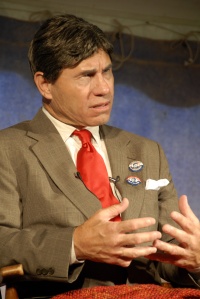
Among the historical figures featured during this year’s Chautauqua was Doug Mishler, who portrayed George Wallace at the La Plata Campus.
A revival of the popular and influential arts and humanities movement in upstate New York and established in Maryland in 1891, Chautauqua has been an annual celebration at CSM since 2000. The program provided through the Maryland Humanities Council attracts several hundred people from throughout Southern Maryland as well as from out-of-state. Providing history in an entertaining format, the free program included opening musical acts followed by a Chautauqua actor portraying the evening’s historical figure. A question-and-answer session concluded the evening.
Chautauqua brings scholar/actors and the local community together to experience moments of American history and to talk about the characters and ideas of the times being portrayed. This year’s theme was “Civil Rights: Taking a Stand” and featured in addition to Mishler’s presentation of Wallace were Martin Luther King Jr. portrayed by Bill Grimmette, Rosa Parks depicted by Gwendolyn Briley-Strand, and Malcolm X portrayed by Charles Everett Page.
Audience member Carol Flowers of Port Tobacco, who has attended previous Chautauquas at CSM, said of Mishler’s presentation, “I just learned so much. I was in my 20s when all of this was going on, and all I knew was what was on the television.”
Mishler, wearing a light brown suit with a bright red tie, began his performance sitting in a chair as a paralyzed Wallace, who was shot by Arthur H. Bremer in 1972. Mishler spoke in character as Wallace, about growing up as a poor sharecropper who picked cotton, his rise in politics, even a love for a young girl in college who could damage his image as a champion of the common man because she drove a Cadillac.
Mishler then addressed Wallace’s regrets for his mistakes, Wallace’s meeting with Jesse Jackson, and how it hurt Wallace to be called “racist” and described as full of hate. “All I ever wanted to do was fight for the little man and his rights,” said Mishler in character. As Wallace he continued, “I just never realized that in my fighting I was stepping on the rights of the Negro and should have been fighting for him as well.”
Mishler paused, and then stood to signal a change in time as he took the audience to Wallace’s 1962 inaugural address on the steps of the University of Alabama. Mishler repeated Wallace’s words, “Segregation today, segregation tomorrow, segregation forever.”
During a question-and-answer session following the performance, Mishler, again speaking as Wallace, said, “Even when I said that, I knew segregation was coming to an end. My hope was that it could buy enough time keeping the South peaceful to let this thing progress. I was hoping for 10 years for a complete integration of society.”
Mishler also discussed Wallace’s sentiment that integration would take time, saying, “The North tried to end segregation too rapidly. Segregation was holding the society together … It causes violence and discontent if you come and try to change a system people believed in for 30 to 40 years.”
Portraying Wallace as a firm believer in helping the little man, Mishler said, “It ain’t right that some folks barely have a trailer to live in and you have your third house.”
“If all the little people stand together we can change this place,” Mishler said in concluding his characterization of Wallace.
Audience member Joan Chapman of Waldorf said, “It was very informative. I learned things about George Wallace that I had never heard before.”
During the final question-and-answer session in which he explained his preparation and research to portray Wallace, Mishler said, “The more I worked on him, the more I became confused. We’re still having a hard time figuring out what is truth with George Wallace and what is politics.”
Chautauqua was sponsored by Constellation Energy, the National Endowment for the Humanities, and the Maryland Department of Planning Maryland Historical Trust. Opening musical performances were provided by The New Community Church of God In Christ Gospel Choir, David and Ginger Hildebrand, and Eric Scott.
CSM partnered with the National Association for the Advancement of Colored People-Calvert County Branch, African American Heritage Society of Charles County, the Unified Committee for Afro-American Contributions and the Southern Maryland Studies Center at CSM to provide historical information, photos, displays and documentation about the lives of African-Americans in Southern Maryland.


